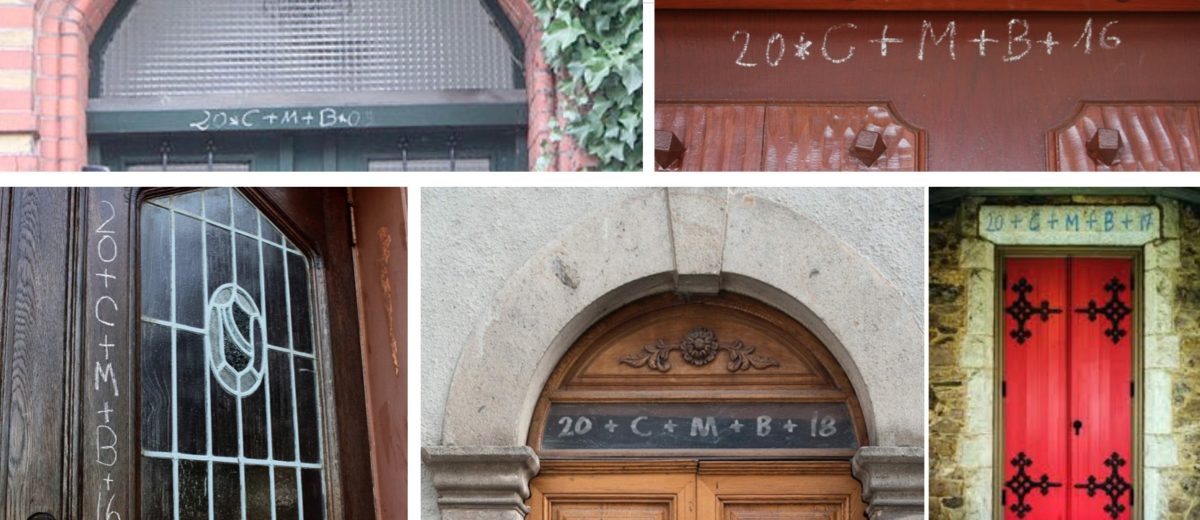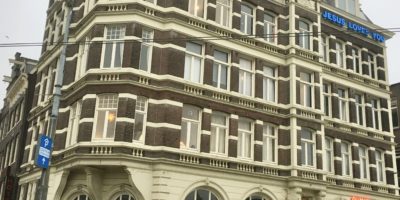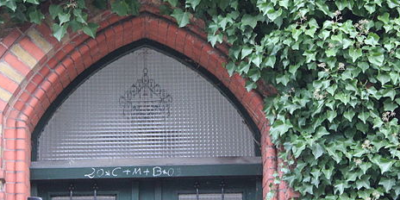(The photo with yesterday’s version of this ww was automatically cropped and omitted the chalked message referred to in the text.)
Christmas is over for the Western world. The decorations have been put away again for another year. The New Year is now under way, for better or for worse. Life is returning to ‘normal’.
Epiphany, or Three Kings’ Day, has just been celebrated in more traditional churches. Saturday, January 6, the 12th day of Christmas, marked the official end to the festive season. Until a century or two ago, Epiphany was actually more important than Christmas Day. It marked both the wise men’s visit to the infant Jesus and also Jesus’ baptism by John the Baptist.
The word ‘Epiphany’ comes from Greek and means ‘manifestation’. It celebrates God’s revelation in his Son as human in Jesus Christ. As the visit of the Magi is traditionally viewed as symbolic of God’s self-revelation to the Gentiles, Epiphany has a missions dimension.
In many European countries, one can see chalked patterns over the front doors of houses such as in the photo above all through the year. This is the practice of ‘chalking doors’ with numbers and letters during Epiphany. For example: 20+C+M+B+18. For those like myself from less traditional church backgrounds, this activity seems rather esoteric and mysterious. In reality, it has deep biblical meaning and precedence.
The numbers refer to the calendar year (20 and 18, for instance, for the year 2018); the crosses stand for Christ. The letters C, M, and B are the initials for the traditional names of the Magi (Caspar, Melchior, and Balthasar). But their main significance is as a way of remembering the Latin blessing Christus mansionem benedicat, which means, May Christ bless this house.
Hospitality
Some view this custom of chalking the door as following the example of the Israelites in the Old Testament who marked their doors during Passover in order to be saved from the angel of death. So too the Epiphanytide practice is traditionally believed to protect Christian homes from evil spirits until the next Epiphany Day, at which time the custom is repeated.
Roman Catholics, Anglicans and Lutherans, as well as some Methodists, Presbyterians and others, ‘chalk their doors’ to invite God’s presence into their home, just as the Holy Family showed hospitality to the Magi (and thus all Gentiles). They view the act as consecrating their homes ‘as places of Christian hospitality, as safe and peaceful outposts of the Kingdom of God in the world, as habitations of healing and rest’. As God has ‘manifested’ Himself and dwells with us, so we should desire the life in our homes to reveal Christ to others.
Chalk, an ordinary substance of the earth, is seen as dust put to holy use. It reminds us that ‘we are of the dust of the ground, the most ordinary of substances, and yet are fashioned as holy beings for holy purposes’. Chalk leaves no permanent mark. Rain and sun will likely fade the mark over time, but each time dwellers enter their homes, they are reminded of the reason for it and challenged to reconsecrate themselves to that purpose. While typically the markings are intended to remain at least until the Feast of Pentecost, often they are not be removed at all. Another year passes and a new Epiphany arrives for a fresh dedication to be Lights of the World.
Outposts
Epiphany reminds us that Christmas is not a season for its own sake. It points to a message to be lived out all year long. Christmas is the promise of things to come, a sign of hope. “A Saviour is born” announced the angels, the carols and the Christmas cards. Exactly how he would bring this salvation was not clear to the shepherds, the wise men, or even Joseph and Mary. Mary, pregnant with God’s future, had simply to ponder all these things in her heart. What was clear that something was happening, a new stage was being reached in God’s plan. There was something to look forward to.
As life resumes its usual routine, we do well to ponder the meaning of Christmas for this coming year. We too are pregnant with God’s future, expecting the unfolding of his purposes, yet knowing that full understanding will elude us for the present. Jesus has come to restore God’s original purposes… for everything. So our lives in all areas are to be lived now in the light of that future.
Our homes are the starting point for that future to be fleshed out as ‘habitations of healing and rest’, as stated above; ‘as safe and peaceful outposts of the Kingdom of God’.
These are our prayers for the new home Romkje and I have been setting up this past month in the centre of Amsterdam as we look forward to what God has for us in this new year.
Till next week,



